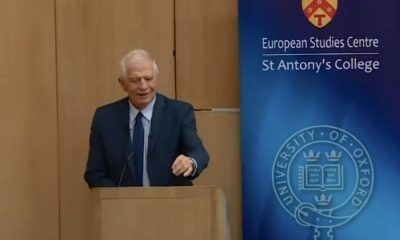EU
Sèb politisyen sou jijman anba sispèk nan krim lagè

 A leading Kosovo Serb politician has gone on trial on suspicion of war crimes.
A leading Kosovo Serb politician has gone on trial on suspicion of war crimes.
Oliver Ivanovic (foto), 60, had been identified as a suspect during a war crimes investigation soon after the 1990s Kosovo conflict ended.
Ivanovic, a former state secretary at the Serbian Ministry for Kosovo, has gone on trial in Mitrovica, Croatia, before an international EULEX (European Union Rule of Law) judge.
The trial started nan Mèkredi (21 janvye) and is expected to last several weeks.
He is suspected of having tortured and murdered ethnic Albanians and is alleged to have been one of the organizers of a now disbanded Kosovo Serb vigilante group known as "Bridgewatchers" - suspected of violence against ethnic Albanians.
The 1998-1999 conflict began when ethnic Albanians rebelled against Belgrade, prompting a brutal crackdown.
Some 120,000 ethnic Serbs live in Kosovo, which declared independence from Serbia in 2008 and which counts 1.8 million inhabitants, most of whom are ethnic Albanians.
However, the 40,000 or so Kosovo Serbs living in the north do not recognize Kosovo's independence. Serbia also rejects Kosovo's secession.
The trial of Ivanovic for alleged crimes during the Kosovo War has, however, been condemned by several former senior leaders from the United Nations, the OSC E and the European Union.
In a joint statement issued to coincide with the launch of his trial this week, they raised questions about the prosecution.
They say that an earlier U.N. investigation carried out in 2000-2003 found that Ivanovic had no connection to the killing of ethnic Albanians in Kosovo. The current indictment was brought by the European Union Rule of Law (EULEX) Mission in Kosovo.
Leading the criticism is William Nash, a former U.N. administrator in Mitrovica and currently a visiting lecturer at Princeton University, who said, “This is the wrong time and the wrong person to indict.
He said, "These old charges come 14 years after the event and they have been leveled against the one Kosovo Serb who even The Economist has called a 'leading force for ethnic reconciliation in the north.'"
Some of Ivanovic’s former colleagues said they fear the allegations against him are politically motivated and amount to little more than recycled rumours that have already been addressed.
The indictment says “there is well-grounded suspicion” that on 14 April 1999 during the NATO bombing of Serbia and the invasion of Kosovo – Ivanovic incited police and paramilitary groups to murder nine Albanians, three of whom were subsequently shot dead."
EULEX prosecutors also allege that on 3 February 2000 Ivanovic, and former Mitrovica Police Commander Dragoljub Delibasic, incited or ordered police and paramilitaries to expel ethnic Albanians from their homes in northern Mitrovica “with the eventual intent to murder or inflict bodily injury upon them”.
Ivanovic, who has denied all charges at earlier hearings, was arrested and imprisoned on 27 January 2014, but charges were not presented until August 2014.
Now, nearly 12 months after his original detention, he still remains imprisoned. It has been claimed that this breaches European norms on pre-trial detention; norms which EULEX is seeking to establish in Kosovo.
In the interim EULEX itself has been under fire for allegedly covering up bribery and corruption at top levels in the mission.
Maria Bamieh, a British EULEX prosecutor was dismissed last October for ‘gross misconduct’, soon after making these allegations.
European Ombudsman Emily O’Reilly reported last month that allegations of irregularities with EULEX had been set out in 2012 in a report by a EULEX prosecutor.
The Irish official noted “the Ombudsman trusts that the question of how such an important document could disappear…will be examined when looking at possible shortcomings in the EULEX operations.”
O’Reilly has reserved the right to revisit this matter once a criminal pre-trial investigation and/or experienced expert have presented their conclusions.
Ivanovic has declared the charges against him are ‘political’ and has pointed out that investigations conducted by UNMIK Police and prosecutors in 2000-2003 found that he had no connection with the killing of ethnic Albanians in Kosovo.
Pataje atik sa a:
-

 Komen Etranje ak Règleman Sekirite4 jou de sa
Komen Etranje ak Règleman Sekirite4 jou de saChèf politik etranjè Inyon Ewopeyen an fè yon kòz komen ak UK nan mitan konfwontasyon mondyal la
-

 EU5 jou de sa
EU5 jou de saJounen Mondyal Libète Laprès: Stop Media Ban anonse Petisyon Ewopeyen an kont deblozay Gouvènman Moldavi sou laprès.
-

 Iran2 jou de sa
Iran2 jou de saPoukisa apèl palman Inyon Ewopeyen an pou fè lis IRGC kòm yon òganizasyon laterè poko adrese?
-

 Kyrgyzstan3 jou de sa
Kyrgyzstan3 jou de saEnpak Migrasyon Mass Ris sou tansyon etnik nan Kyrgyzstan



























